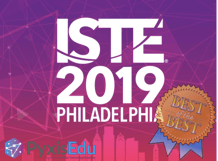ISTE19 in Philadelphia has come and gone, but our team is still engaged in invigorating conversations as we process and share the awesome learning that occurred at the conference! Here are some of our learners’ top takeaways.
1. I met @Mister_Kelly at a poster session and absolutely loved what he was doing to personalize learning for his teachers! David Kelly is an Instructional Technologist from South Carolina and works with a large district. His coaching model and resources shared out at ISTE are admirable, as he used learner profiles, learning pathways, and flexible ways for many, many, many teachers to learn. This is something that I would like to replicate this year! Check out his Wakelet to learn more about how he personalized professional development to support his teachers! – Jenna Langel (@jenna_langel)
2. ISTE never fails to be a bit overwhelming for me. I always seem to over commit myself to booth presentations and session presentations which means my learning bucket is often empty at the end of the conference instead of filled. What I most appreciate post-ISTE is the sharing and curating of information so I can now learn and explore new resources on my own time during the month of July and beyond. These takeaways are priceless! My friend and colleague @NikkiDRobertson has curated many sessions that I look forward to delving into very soon! – Sherry Gick (@sherryngick)
3. Student achievement will rely on partnerships and teacher passion. In terms of partnerships, it will be important for technology companies and various educational organizations to continue to work together to make big things happen. Google partnering with tech companies like Screencastify, Peardeck, and others helps both parties and students. Educator passions are intoxicating. At ISTE, educators come from all over the world to share their passions and expertise. Educators will also be advocates for technology that they believe in and will use their passions to drive its impact. – Brett Miller (@bmiller_FSTS)
4. There are so many education models (Blooms, SAMR, Gardener’s Multiple Intelligences, etc) but no model of how to differentiate instruction using technology. The team of Matt Miller (Ditch That Textbook) and Nate and Angie Ridgeway (a son and mother duo) has created a helpful framework for educators. This framework focuses on four areas where differentiation can happen in our lessons: Activate Attention, Apply the Real World, Personalize Content, and Promote Metacognition and the tools/strategies teachers can use to effectively incorporate them. However, my biggest takeaway from this is that differentiation in a classroom is a continuum. Educators are not going to be able to do everything all the time even with technology! Matt, Nate, and Angie recorded their ISTE session and shared it out on along with the session handout. You can find it here. – Sean Fahey (@SEANJFAHEY)
5. I loved hearing Dr. Dan Shepherd from Missouri Western University talk about what the research says on what foundations teacher leaders in technology need to espouse in order to create an effective, innovative, and impactful educational technology culture in their organizations. They must be able to 1) “communicate a clear and consistent vision”, 2) “develop meaningful professional relationships with those they seek to have greater influence over” and 3) “lead with unquestioned integrity”. By reflecting on and integrating these characteristics in their professional work, teacher leaders can lay a solid foundation on which to build long-term, meaningful and sustainable change. – Meighan Scott (@MeighanScott1)
Were you #NotAtISTE? No problem! We put together a FREE PyxisEdu Collection that is full of information regarding new updates and ideas from leading ed-tech programs and applications featured at ISTE 2019. Check it out here! If you don’t already have a PyxisEdu account, simply create a free account to dive into these resources.

